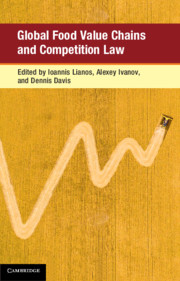Book contents
- Global Food Value Chains and Competition Law
- Global Competition Law and Economics Policy
- Global Food Value Chains and Competition Law
- Copyright page
- Contents
- List of Authors
- 1 Global Food Value Chains
- 2 Rents, Power and Governance in Global Value Chains
- 3 The Financialization of Land and Agriculture
- 4 Agriculture, End to End
- 5 New Forms of Financing the Agricultural Sector in Brazil
- 6 Economic Concentration and the Food Value Chain
- 7 The State of American Competition Law with Respect to the Food Chain
- 8 The Brazilian Food Value Chain and Competition Policy
- 9 Competition Concerns in Fertilizer Import-Dependent Countries like India and China
- 10 Russian Competition Policy Over Value Chains in Agricultural and Food Sectors
- 11 The Pioneer/Pannar Merger, the Maize Seed Value Chain and Globalisation
- 12 Power in the Food Value Chain
- 13 Efficiency and Fairness
- 14 China’s Legal Regulation of the Abuse of Market Power by Large Retailers
- 15 Superior Bargaining Power in Russian Contract and Competition Law
- 16 Regulating Unfair Trading Practices in the EU Food Supply Chain
- 17 Food Chain Certification and the Social Pluralism of Competition Law
- 18 Hunger Games
- 19 Agribiotech Patents in the Food Supply Chain
- 20 Mergers and Product Innovation
- 21 The Global Grain Trade
- Index
19 - Agribiotech Patents in the Food Supply Chain
A US Perspective
Published online by Cambridge University Press: 12 May 2022
- Global Food Value Chains and Competition Law
- Global Competition Law and Economics Policy
- Global Food Value Chains and Competition Law
- Copyright page
- Contents
- List of Authors
- 1 Global Food Value Chains
- 2 Rents, Power and Governance in Global Value Chains
- 3 The Financialization of Land and Agriculture
- 4 Agriculture, End to End
- 5 New Forms of Financing the Agricultural Sector in Brazil
- 6 Economic Concentration and the Food Value Chain
- 7 The State of American Competition Law with Respect to the Food Chain
- 8 The Brazilian Food Value Chain and Competition Policy
- 9 Competition Concerns in Fertilizer Import-Dependent Countries like India and China
- 10 Russian Competition Policy Over Value Chains in Agricultural and Food Sectors
- 11 The Pioneer/Pannar Merger, the Maize Seed Value Chain and Globalisation
- 12 Power in the Food Value Chain
- 13 Efficiency and Fairness
- 14 China’s Legal Regulation of the Abuse of Market Power by Large Retailers
- 15 Superior Bargaining Power in Russian Contract and Competition Law
- 16 Regulating Unfair Trading Practices in the EU Food Supply Chain
- 17 Food Chain Certification and the Social Pluralism of Competition Law
- 18 Hunger Games
- 19 Agribiotech Patents in the Food Supply Chain
- 20 Mergers and Product Innovation
- 21 The Global Grain Trade
- Index
Summary
Chapter 19 explores U.S. agribiotech patent issues as they relate to the food supply chain. Agribiotech patents challenge how we think about fundamental issues of seed ownership, innovation, and when downstream uses are or should be permissible. The chapter first sketches the arc of agribiotech developments in the U.S. from its colonial past to the current day and observes the evolution of protection over seed traits transition from an open socialist-style franchise to a tightly controlled oligarchy subsisting on patent rights. It then assesses patent exhaustion through the lens of Bowman and the Court’s more recent decision in Impression Prod., Inc. v. Lexmark Int'l, Inc.Finally, the author offers observations on three issues: (1) patentees and generic seed companies will remain invested in maintaining compliance for transgenic seed exports; (2) the recent spate of mega-mergers continue the transformation set in motion by the privatization of agriculture more than a century ago, with these mergers benefiting agribiotech companies and farmers abroad, unfortunately, at the expense of U.S. farmers at home; and (3) developments such as retaliatory tariffs on transgenic seed exports will affect agribiotech innovation as surely as developments in patent law, and should be part of any comprehensive analysis of dynamic trends in the food value chain.
Keywords
- Type
- Chapter
- Information
- Global Food Value Chains and Competition Law , pp. 478 - 503Publisher: Cambridge University PressPrint publication year: 2022

